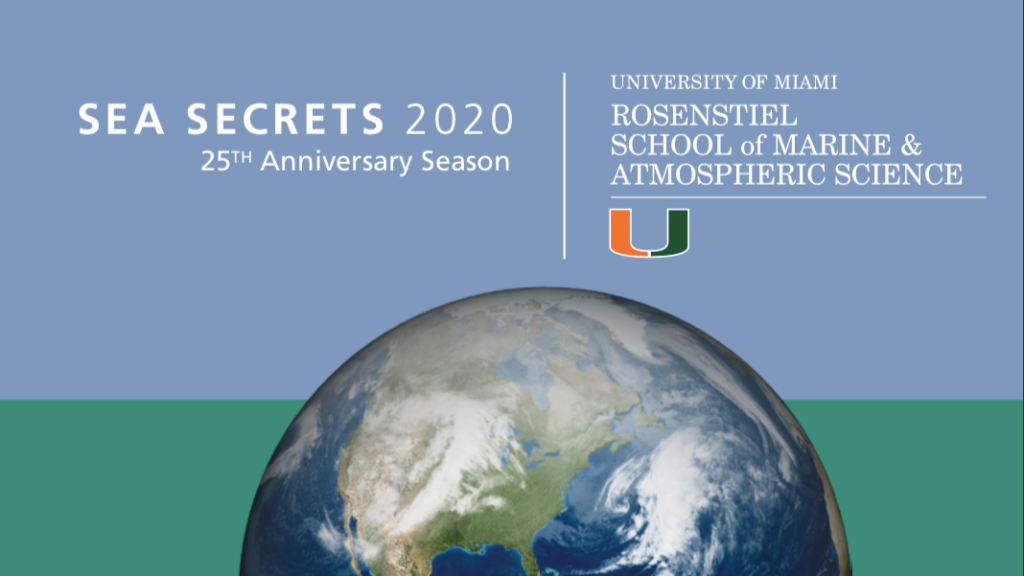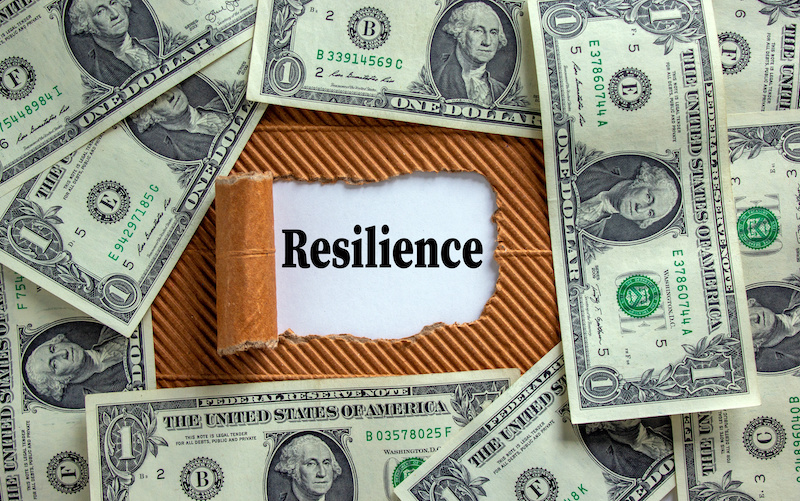Sea Secrets Series Shows Dramatic Growth
Nancy Beth JacksonJanuary 13, 2020

The Sea Secrets lecture series at the Rosenstiel School of Marine and Atmospheric Science begins Jan. 21
The hottest ticket in town may be a free ticket to the University of Miami Rosenstiel School’s Sea Secrets series, which opens its 25th season on Jan. 21 with a talk by the chief scientist at the National Oceanic and Atmospheric Administration (NOAA).
Attendance has grown dramatically in recent years, boosted by concern for the environment, social media marketing and an increasingly impressive list of speakers.
“This is the largest and most important outreach event we do for the public,” said Diana Udel, director of communication at Rosenstiel.
Last year 450 people signed up online for an auditorium that can seat only 220. Even thought not everyone showed, the overflow – usually around 80 people — ended up watching on the big screen in the SALT Restaurant where the pre-talk reception is held.
“It shouldn’t be a problem this year. We have streamlined the process,” Udel said, adding that the sound system has been improved in the restaurant area. Lectures are also videotaped and uploaded on YouTube.
How the series started
Robert Ginsburg, a marine geologist who arrived here in 1950 as a research assistant, began the series a quarter of a century ago for a much smaller audience, which grew by word of mouth. Ginsberg, who died in 2017 at age 92, was honored earlier this month at a three-day Legacy Symposium at the school. An endowed chair in marine geosciences has been established to honor the legendary scientist.
Talks were intended for the community rather than the university although in the early years a few talks were scheduled on the main campus in Coral Gables.
Originally called the Blue Planet Lecture Series, it evolved into Sea Secrets over a decade ago. It still has a community feel, particularly for Key Biscayners who meet up with friends over drinks and nibbles in the pre-talk reception with bay views.
“The greatest supporters have been Key Biscayne residents. We’re grateful for their support,” Udel said. Individual residents and the Key Biscayne Community Foundation have been major contributors to the Bank of America-sponsored series.
How to get tickets
Lectures begin at 7 pm preceded by the free reception at 6:30 pm. You can reserve a ticket – but not an auditorium seat – online through Eventbrite. Actual tickets are handed out starting at 5:45 pm with doors opening at 6 pm. Early comers can still enjoy the reception but with less choice of auditorium seating. The lounge also remains an option.
One sure way to be guaranteed a choice seat plus an invitation to a private 5:30 pm reception with the speaker is to donate to Sea Secrets. A series VIP ticket is $500. Or you can become a major sponsor with a minimum contribution of $5,000.
What’s on the program this year
“If You Like Your Weather Forecast, Thank…an Oceanographer”: Craig Mclean, acting chief scientist of NOAA, was scheduled last year to discuss the state of ocean science and policy but had to canceled because of a federal government shutdown. Date: January 21
“Stressed, Depressed and Angry” What Toadfish Can Teach Us About Human Health and Disease”: Danielle McDonald, Ph.D., professor, Department of Marine Biology and Ecology at Rosenstiel, studies fish to discover why human brains swell during liver failure, and what the serotonin transporter, the target of antidepressants, is doing to control blood pressure. Date: February 11
“Actionable Earth System Science”: Everette Joseph, PhD, director of the National Center for Atmospheric Research (NICAR), will share how research is taking place and the evolution of the earth system science community to benefit society. Date: March 3
“From Genes to Aquaculture”: Berta Levavi-Sivan, Ph.D., vice director and animal sciences professor at the Hebrew University of Jerusalem, specializes in aquaculture, exploring how the fish brain regulates a cascade of hormones that control reproduction, growth and metabolism. Date: March 31
“Changing Ice, Changing Coastlines”: Robin Elizabeth Bell, Ph.D., research professor, Lamont-Doherty Earth Observatory at Columbia University, has coordinated 10 major aero-geophysical expeditions to Antarctica and Greenland, discovered a volcano under the West Antarctica ice sheet and found several lakes beneath two miles of ice. Date: April 28


